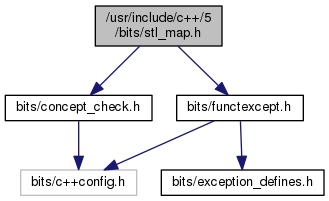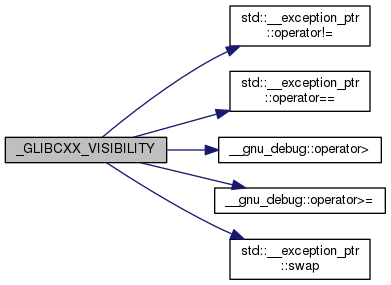This is an internal header file, included by other library headers. More...

Functions | |
| namespace std | _GLIBCXX_VISIBILITY (default) |
This is an internal header file, included by other library headers.
Do not attempt to use it directly. {map}
| namespace std _GLIBCXX_VISIBILITY | ( | default | ) |
A standard container made up of (key,value) pairs, which can be retrieved based on a key, in logarithmic time.
| _Key | Type of key objects. |
| _Tp | Type of mapped objects. |
| _Compare | Comparison function object type, defaults to less<_Key>. |
| _Alloc | Allocator type, defaults to allocator<pair<const _Key, _Tp>. |
Meets the requirements of a container, a reversible container, and an associative container (using unique keys). For a map<Key,T> the key_type is Key, the mapped_type is T, and the value_type is std::pair<const Key,T>.
Maps support bidirectional iterators.
The private tree data is declared exactly the same way for map and multimap; the distinction is made entirely in how the tree functions are called (*_unique versus *_equal, same as the standard).
This turns a red-black tree into a [multi]map.
The actual tree structure.
Default constructor creates no elements.
Creates a map with no elements.
| __comp | A comparison object. |
| __a | An allocator object. |
Map copy constructor.
| __x | A map of identical element and allocator types. |
The newly-created map uses a copy of the allocation object used by __x.
Builds a map from a range.
| __first | An input iterator. |
| __last | An input iterator. |
Create a map consisting of copies of the elements from [__first,__last). This is linear in N if the range is already sorted, and NlogN otherwise (where N is distance(__first,__last)).
Builds a map from a range.
| __first | An input iterator. |
| __last | An input iterator. |
| __comp | A comparison functor. |
| __a | An allocator object. |
Create a map consisting of copies of the elements from [__first,__last). This is linear in N if the range is already sorted, and NlogN otherwise (where N is distance(__first,__last)).
The dtor only erases the elements, and note that if the elements themselves are pointers, the pointed-to memory is not touched in any way. Managing the pointer is the user's responsibility.
Map assignment operator.
| __x | A map of identical element and allocator types. |
All the elements of __x are copied, but unlike the copy constructor, the allocator object is not copied.
Get a copy of the memory allocation object.
Returns a read/write iterator that points to the first pair in the map. Iteration is done in ascending order according to the keys.
Returns a read-only (constant) iterator that points to the first pair in the map. Iteration is done in ascending order according to the keys.
Returns a read/write iterator that points one past the last pair in the map. Iteration is done in ascending order according to the keys.
Returns a read-only (constant) iterator that points one past the last pair in the map. Iteration is done in ascending order according to the keys.
Returns a read/write reverse iterator that points to the last pair in the map. Iteration is done in descending order according to the keys.
Returns a read-only (constant) reverse iterator that points to the last pair in the map. Iteration is done in descending order according to the keys.
Returns a read/write reverse iterator that points to one before the first pair in the map. Iteration is done in descending order according to the keys.
Returns a read-only (constant) reverse iterator that points to one before the first pair in the map. Iteration is done in descending order according to the keys.
Returns true if the map is empty. (Thus begin() would equal end().)
Returns the size of the map.
Returns the maximum size of the map.
Subscript ( [] ) access to map data.
| __k | The key for which data should be retrieved. |
Allows for easy lookup with the subscript ( [] ) operator. Returns data associated with the key specified in subscript. If the key does not exist, a pair with that key is created using default values, which is then returned.
Lookup requires logarithmic time.
Access to map data.
| __k | The key for which data should be retrieved. |
| std::out_of_range | If no such data is present. |
Attempts to insert a std::pair into the map.
| __x | Pair to be inserted (see std::make_pair for easy creation of pairs). |
This function attempts to insert a (key, value) pair into the map. A map relies on unique keys and thus a pair is only inserted if its first element (the key) is not already present in the map.
Insertion requires logarithmic time.
Attempts to insert a std::pair into the map.
| __position | An iterator that serves as a hint as to where the pair should be inserted. |
| __x | Pair to be inserted (see std::make_pair for easy creation of pairs). |
This function is not concerned about whether the insertion took place, and thus does not return a boolean like the single-argument insert() does. Note that the first parameter is only a hint and can potentially improve the performance of the insertion process. A bad hint would cause no gains in efficiency.
See https://gcc.gnu.org/onlinedocs/libstdc++/manual/associative.html#containers.associative.insert_hints for more on hinting.
Insertion requires logarithmic time (if the hint is not taken).
Template function that attempts to insert a range of elements.
| __first | Iterator pointing to the start of the range to be inserted. |
| __last | Iterator pointing to the end of the range. |
Complexity similar to that of the range constructor.
Erases an element from a map.
| __position | An iterator pointing to the element to be erased. |
This function erases an element, pointed to by the given iterator, from a map. Note that this function only erases the element, and that if the element is itself a pointer, the pointed-to memory is not touched in any way. Managing the pointer is the user's responsibility.
Erases elements according to the provided key.
| __x | Key of element to be erased. |
This function erases all the elements located by the given key from a map. Note that this function only erases the element, and that if the element is itself a pointer, the pointed-to memory is not touched in any way. Managing the pointer is the user's responsibility.
Erases a [__first,__last) range of elements from a map.
| __first | Iterator pointing to the start of the range to be erased. |
| __last | Iterator pointing to the end of the range to be erased. |
This function erases a sequence of elements from a map. Note that this function only erases the element, and that if the element is itself a pointer, the pointed-to memory is not touched in any way. Managing the pointer is the user's responsibility.
Swaps data with another map.
| __x | A map of the same element and allocator types. |
This exchanges the elements between two maps in constant time. (It is only swapping a pointer, an integer, and an instance of the Compare type (which itself is often stateless and empty), so it should be quite fast.) Note that the global std::swap() function is specialized such that std::swap(m1,m2) will feed to this function.
Erases all elements in a map. Note that this function only erases the elements, and that if the elements themselves are pointers, the pointed-to memory is not touched in any way. Managing the pointer is the user's responsibility.
Returns the key comparison object out of which the map was constructed.
Returns a value comparison object, built from the key comparison object out of which the map was constructed.
Tries to locate an element in a map.
| __x | Key of (key, value) pair to be located. |
This function takes a key and tries to locate the element with which the key matches. If successful the function returns an iterator pointing to the sought after pair. If unsuccessful it returns the past-the-end ( end() ) iterator.
Tries to locate an element in a map.
| __x | Key of (key, value) pair to be located. |
This function takes a key and tries to locate the element with which the key matches. If successful the function returns a constant iterator pointing to the sought after pair. If unsuccessful it returns the past-the-end ( end() ) iterator.
Finds the number of elements with given key.
| __x | Key of (key, value) pairs to be located. |
This function only makes sense for multimaps; for map the result will either be 0 (not present) or 1 (present).
Finds the beginning of a subsequence matching given key.
| __x | Key of (key, value) pair to be located. |
This function returns the first element of a subsequence of elements that matches the given key. If unsuccessful it returns an iterator pointing to the first element that has a greater value than given key or end() if no such element exists.
Finds the beginning of a subsequence matching given key.
| __x | Key of (key, value) pair to be located. |
This function returns the first element of a subsequence of elements that matches the given key. If unsuccessful it returns an iterator pointing to the first element that has a greater value than given key or end() if no such element exists.
Finds the end of a subsequence matching given key.
| __x | Key of (key, value) pair to be located. |
Finds the end of a subsequence matching given key.
| __x | Key of (key, value) pair to be located. |
Finds a subsequence matching given key.
| __x | Key of (key, value) pairs to be located. |
This function is equivalent to
(but is faster than making the calls separately).
This function probably only makes sense for multimaps.
Finds a subsequence matching given key.
| __x | Key of (key, value) pairs to be located. |
This function is equivalent to
(but is faster than making the calls separately).
This function probably only makes sense for multimaps.
Map equality comparison.
| __x | A map. |
| __y | A map of the same type as x. |
This is an equivalence relation. It is linear in the size of the maps. Maps are considered equivalent if their sizes are equal, and if corresponding elements compare equal.
Map ordering relation.
| __x | A map. |
| __y | A map of the same type as x. |
This is a total ordering relation. It is linear in the size of the maps. The elements must be comparable with <.
See std::lexicographical_compare() for how the determination is made.
Based on operator==
Based on operator<
Based on operator<
Based on operator<
See std::map::swap().
References __glibcxx_class_requires, __glibcxx_class_requires2, __glibcxx_class_requires4, __glibcxx_function_requires, std::__exception_ptr::operator!=(), std::__exception_ptr::operator==(), __gnu_debug::operator>(), __gnu_debug::operator>=(), and std::__exception_ptr::swap().
